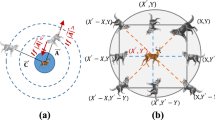Abstract
The paper concerns the hybrid optimization of fuzzy inference systems that is based on Hierarchical Fair Competition-based Genetic Algorithms (HFCGA) and information data granulation. HFCGA is a kind of multi-populations of Parallel Genetic Algorithms (PGA), and it is used for structure optimization and parameter identification of fuzzy model. The granulation is realized with the aid of the Hard C-means clustering (HCM). The concept of information granulation was applied to the fuzzy model in order to enhance the abilities of structural optimization. By doing that, we divide the input space to form the premise part of the fuzzy rules and the consequence part of each fuzzy rule is newly organized based on center points of data group extracted by the HCM clustering. It concerns the fuzzy model-related parameters such as the number of input variables, a collection of specific subset of input variables, the number of membership functions, and the polynomial type of the consequence part of fuzzy rules. In the hybrid optimization process, two general optimization mechanisms are explored. The structural optimization is realized via HFCGA and HCM method whereas in case of the parametric optimization we proceed with a standard least square method as well as HFCGA method as well. A comparative analysis demonstrates that the proposed algorithm is superior to the conventional methods.
Preview
Unable to display preview. Download preview PDF.
Similar content being viewed by others
References
Tong, R.: Synthesis of fuzzy models for industrial processes. Int. J. Gen Syst. 4, 143–162 (1978)
Pedrycz, W.: An identification algorithm in fuzzy relational system. Fuzzy Sets Syst. 13, 153–167 (1984)
Takagi, T., Sugeno, M.: Fuzzy identification of systems and its applications to modeling and control. IEEE Trans. Syst., Cybern. 15(1), 116–132 (1985)
Sugeno, M., Yasukawa, T.: Linguistic modeling based on numerical data. In: IFSA’91, Brussels, Computer, Management & System Science, pp. 264–267 (1991)
Oh, S.K., Pedrycz, W.: Identification of fuzzy systems by means of an auto-tuning algorithm and its application to nonlinear systems. Fuzzy Sets and Syst. 115(2), 205–230 (2000)
Pderycz, W., Vukovich, G.: Granular neural networks. Neurocomputing 36, 205–224 (2001)
Krishnaiah, P.R., Kanal, L.N. (eds.): Classification, pattern recognition, and reduction of dimensionality. Handbook of Statistics, vol. 2. North-Holland, Amsterdam (1982)
Lin, S.C., Goodman, E., Punch, W.: Coarse-Grain Parallel Genetic Algorithms: Categorization and New Approach. In: IEEE Conf. on Parallel and Distrib. Processing (Nov. 1994)
Hu, J.J., Goodman, E.: The Hierarchical Fair Competition (HFC) Model for Parallel Evolutionary Algorithms. In: Proceedings of the 2002 Congress on Evolutionary Computation, CEC2002, Honolulu, Hawaii, IEEE Computer Society Press, Los Alamitos (2002)
Lyu, M.R.: Handbook of Software Reliability Engineering, pp. 510–514. McGraw-Hill, New York (1995)
Oh, S.K., Pderycz, W., Park, B.J.: Self-organizing neurofuzzy networks in modeling software data. Fuzzy Sets and Systems 145, 165–181 (2004)
Oh, S.K., Lee, I.T., Choi, J.N.: Design of Fuzzy Polynomial Neural Networks with the Aid of Genetic Fuzzy Granulation and Its Application to Multi-variable Process System. In: Wang, J., Yi, Z., Żurada, J.M., Lu, B.-L., Yin, H. (eds.) ISNN 2006. LNCS, vol. 3971, pp. 774–779. Springer, Heidelberg (2006)
Author information
Authors and Affiliations
Editor information
Rights and permissions
Copyright information
© 2007 Springer Berlin Heidelberg
About this paper
Cite this paper
Choi, JN., Oh, SK., Hwang, HS. (2007). Optimization of Fuzzy Model Driven to IG and HFC-Based GAs. In: Beliczynski, B., Dzielinski, A., Iwanowski, M., Ribeiro, B. (eds) Adaptive and Natural Computing Algorithms. ICANNGA 2007. Lecture Notes in Computer Science, vol 4431. Springer, Berlin, Heidelberg. https://doi.org/10.1007/978-3-540-71618-1_69
Download citation
DOI: https://doi.org/10.1007/978-3-540-71618-1_69
Publisher Name: Springer, Berlin, Heidelberg
Print ISBN: 978-3-540-71589-4
Online ISBN: 978-3-540-71618-1
eBook Packages: Computer ScienceComputer Science (R0)




